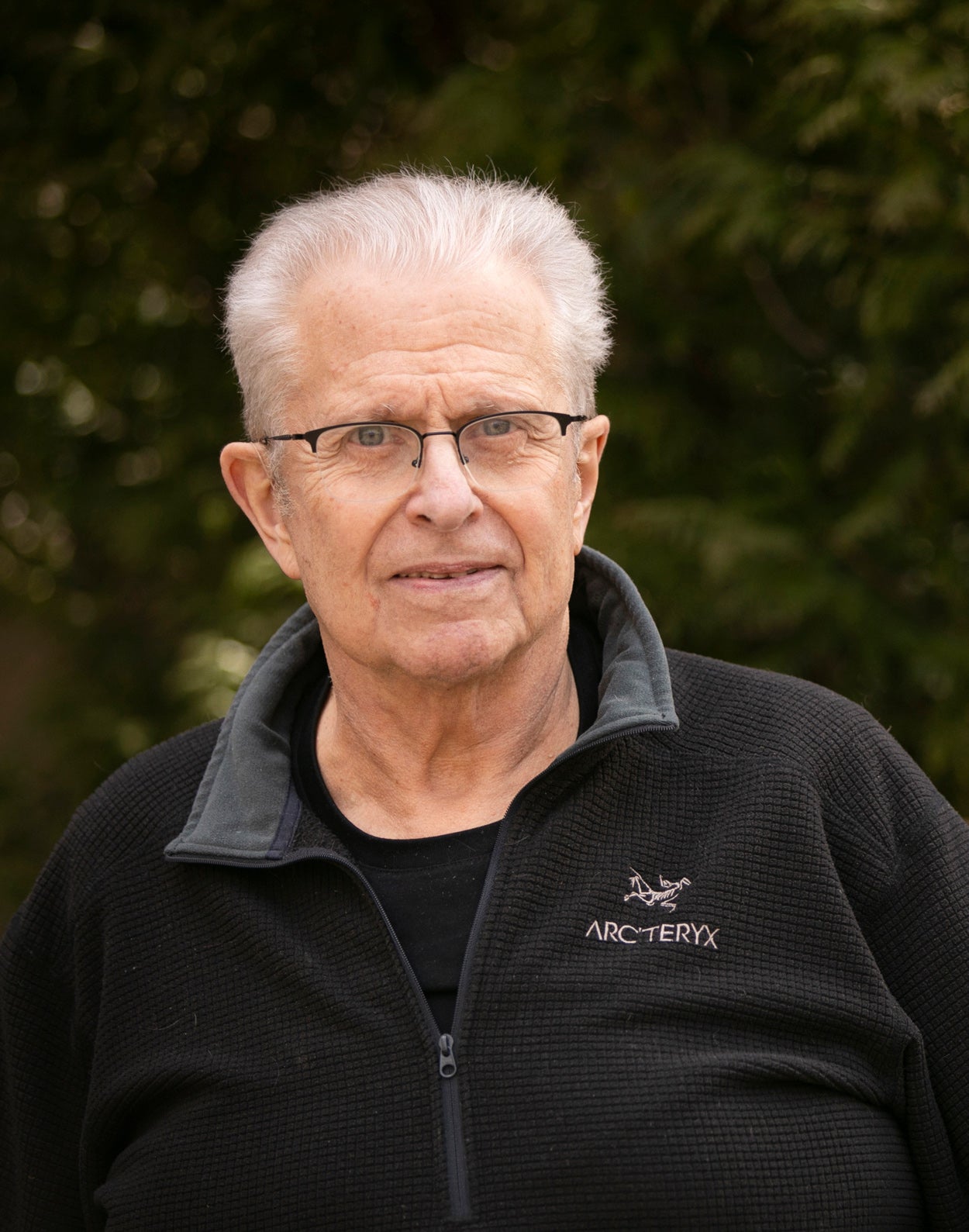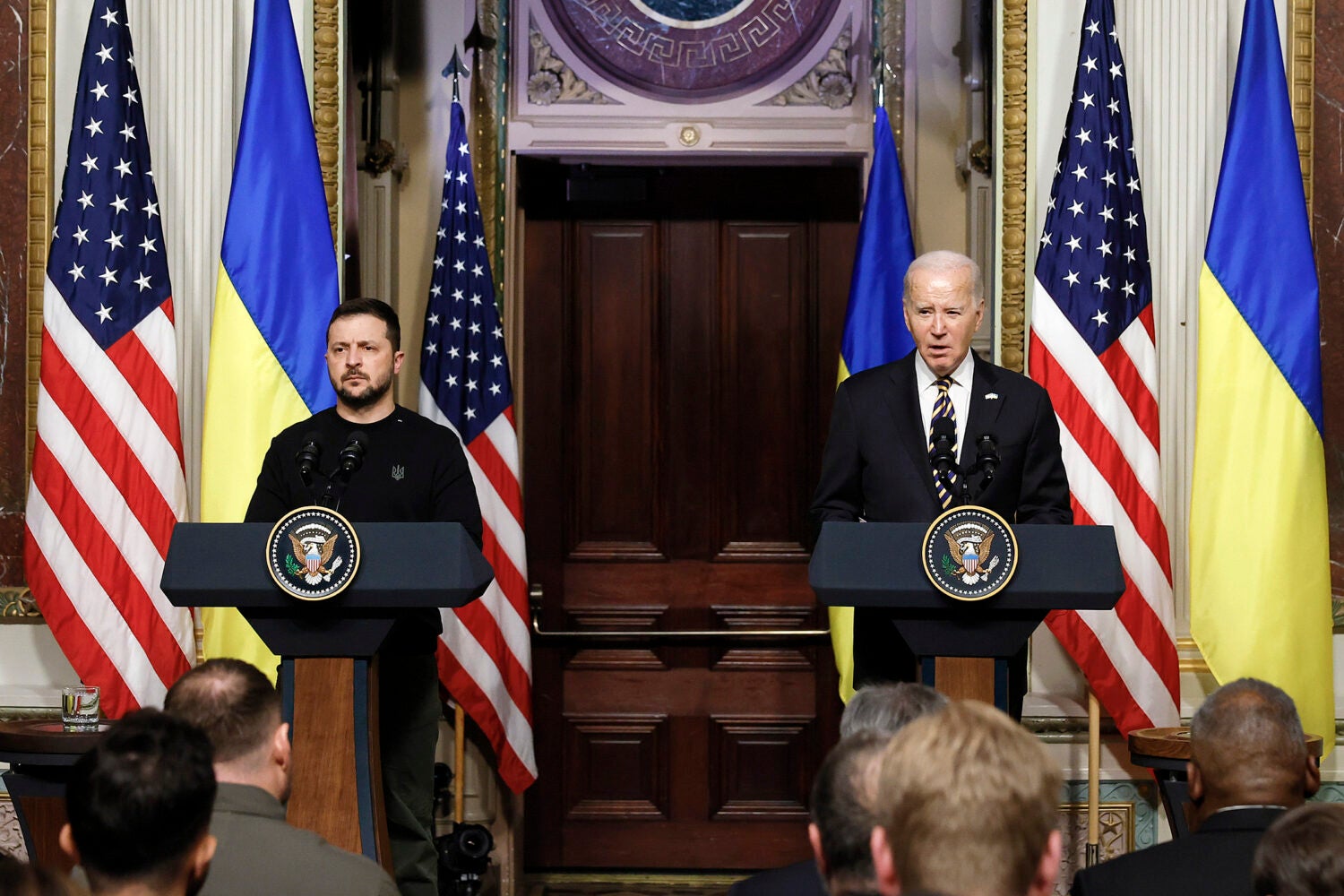As Ukraine’s efforts to repel Russia’s full-scale invasion become increasingly hobbled by a lack of money and material, and congressional debates about providing more aid fall prey to partisan bickering, support is growing in Washington, D.C. and European capitals for a new way to fund the war. And it is being led by two Harvard Law School alumni: Laurence Tribe ’66, the Carl M. Loeb University Professor, Emeritus, and Robert Zoellick ’81, the former head of the World Bank.
In meetings with Biden administration officials and foreign ministers across Europe, and in a series of legal memos and newspaper opinion pieces, Tribe, Zoellick, and other advocates outline the legal and moral merits of forcing one nation to bankroll the lion’s share of Ukraine’s military and reconstruction costs: Russia.

As men and military machines rolled across Ukraine’s borders on February 24, 2022, Treasury officials in Washington and abroad quickly began freezing approximately $300 billion in Russian state assets held abroad in a variety of currencies. Since then, governments and taxpayers have shelled out billions in support, while Russia’s frozen funds have remained safely locked up in bank vaults, generating interest.
According to a nearly 200-page legal analysis co-authored by Tribe for the Renew Democracy Initiative in September 2023, “freezing Russia’s assets is not enough. The United States and its allies can and must do more. Any country that currently holds Russian assets should transfer them to Ukraine.” The memo’s co-authors are Raymond P. Tolentino, Kate M. Harris, Jackson Erpenbach, and Jeremy Lewin ’22.
He and Zoellick contend that international law authorizes governments to transfer those funds to the harmed party as a proportional countermeasure against the invader. Moreover, they argue that a U.S. law — the International Emergency Economic Powers Act, or IEEPA — authorizes the Biden administration to transfer Russian state assets to Ukraine even without action by Congress or a court order.
The two hasten to note that this approach is different from sanctions and only targets Russia’s sovereign assets, rather than personal property such as individual bank accounts or luxury yachts. Instead, they believe it is a legitimate response under international law to a grave violation of another country’s sovereign rights by a malevolent state actor.
Tribe and Zoellick’s efforts to support Ukraine are a long time in the making. “Shortly after Russia’s attack on Ukraine, almost two years ago, I started to think that this was likely to end up as a war of attrition, and a stalemate,” says Zoellick, who also served as U.S. trade representative and deputy secretary of state under President George W. Bush and undersecretary of state and White House deputy chief of staff under George H.W. Bush. “And in wars of attrition, economics are just as important as military supplies. And that seems to be what we’re seeing.”

For Tribe, who first argued for leveraging frozen Russian assets in an April 2022 guest essay in The New York Times he co-authored with Jeremy Lewin, then a third-year law student, the issue was even more personal. “When it became clear that Vladimir Putin was engaging in illegal aggression in a part of Europe that I identify with strongly because my roots are there, and when it became clear that the whole international order was being challenged, I thought that, ‘I can put what I know and what I can discover to use in the best way possible.’” After speaking with Harvard Kennedy School Professor Larry Summers, among others, the renowned constitutional law scholar began constructing the legal framework that underpins the plan.
In addition to making the legal case, Tribe’s memo outlines several of the plan’s benefits and warns of the risks of inaction. He writes that “transferring Russia’s assets to Ukraine will strengthen the international norm against aggression and discourage countries from violating that norm in the future.” On the other hand, he notes, “the failure to act sends a dangerous message to the rest of the world that aggression, war crimes, and genocide will go unpunished.” Finally, he believes that shielding the frozen assets out of respect for Russian sovereignty or property rights would be a “cruel irony,” given its treatment of Ukraine.
Zoellick points out that the idea isn’t unprecedented. “After the first Gulf War, the invasion of Kuwait, the United States, Britain, and France transferred Iraqi reserves to an escrow for injured parties,” he explains.
But as the plan has gained traction at home and abroad, observers have raised several concerns, all of which Tribe and Zoellick argue are misplaced.
Skeptics worry that moving against Russian assets will encourage nations around the globe to abandon U.S. dollars as the world’s primary reserve currency. In response, Zoellick points to recent history. “These assets have been frozen for two years, and it hasn’t exactly led to doom for the dollar in the euro,” he says. “So, that’s a pretty good test.”
“These assets have been frozen for two years, and it hasn’t exactly led to doom for the dollar in the euro. So, that’s a pretty good test.”
Robert Zoellick
In addition, he asks, what other options do countries have? Gold is hard to come by, doesn’t generate interest, is difficult to move and store, and “isn’t exactly a liquid asset.” And given China’s strict control of its currency, the renminbi, nations are reluctant to use it to house their reserves, because, says Zoellick, “you just don’t know what you’re going to get.”
But couldn’t foreign nations use the plan as a blueprint for seizing U.S. assets to satisfy grievances such as the 2001 invasion of Iraq? “This couldn’t be used against the United States,” Zoellick says, because the U.S. doesn’t hold its assets abroad in foreign currencies. Couldn’t hostile nations expropriate property owned by U.S. citizens and corporations abroad? “Frankly, they can do that anytime now. Most don’t. Because if they do … it cuts them off from international financial markets,” he explains, citing Cuba and Venezuela as examples.
One practical obstacle is that the U.S. holds only six to seven billion dollars out of the $300 billion in frozen Russian reserves. Because most of the funds are held abroad — most notably by Euroclear, a financial services company based in Belgium — European governments may also need to act and, in some cases, pass domestic legislation to make the transfer possible. By acting first, Tribe says, the U.S. “will unlock action in Europe as well.”
But in a letter published today in the Financial Times, Zoellick and Philip Zelikow, a U.S. diplomat who served as executive director of the 9/11 Commission, make the case that even some of the funds held by Euroclear could be diverted by America and its allies. “[B]ecause almost 40 per cent of the frozen assets are not euros, but U.S. and Canadian dollars, British pounds and other currencies,” they write. “Those countries can assert jurisdiction over their currencies in Euroclear and demand a transfer to Ukraine.”
“The remarkable heroism of Alexei Navalny, and his grotesque murder by Putin’s regime, constituted a last straw, which it seems to me ought to eliminate any residual resistance to doing everything we can, especially with assets that we now know for sure will never be returned to Russia.”
Laurence Tribe
They also note that Euroclear has over the last two years generated $4 billion in after-tax profits by investing the frozen Russian reserves. “For reputational purposes alone, Euroclear should welcome state action under international law to transfer such profits and Russian funds to a Ukraine that is struggling to survive.”
Many have wondered why Russia, in the runup to the invasion, left so much money abroad to be frozen by western governments. Among other possibilities, Zoellick speculates that, because President Putin kept his invasion plans “quite close,” Russian government officials who oversee its assets were taken by surprise.
According to Zoellick, transferring Russian assets to Ukraine would also get the attention of leaders in China — a nation with trillions of reserves denominated in dollars — at a time when its belligerence towards Taiwan is waxing. “For people who want international law to serve a useful function, it would certainly serve as a deterrent for China, because they wouldn’t want to risk having their reserves be frozen, much less transferred or taken for another use.” And any effort to reduce that risk by converting those assets to other currencies, he argues, would profoundly undermine the value of the renminbi, and wreck China’s ability to export goods and services.
Ultimately, while he believes the law is firmly on his side, Tribe believes the question hinges on a moral imperative. “The extraordinary courage of the Ukrainian people has been, in many ways, the principal inspiration that drove me to keep working hard on this issue,” he explains. “And the remarkable heroism of Alexei Navalny, and his grotesque murder by Putin’s regime, constituted a last straw, which it seems to me ought to eliminate any residual resistance to doing everything we can, especially with assets that we now know for sure will never be returned to Russia.”
Want to stay up to date with Harvard Law Today? Sign up for our weekly newsletter.
